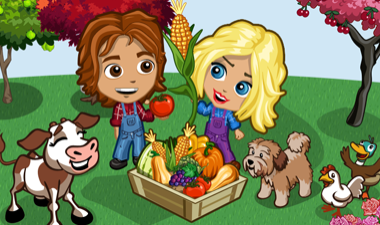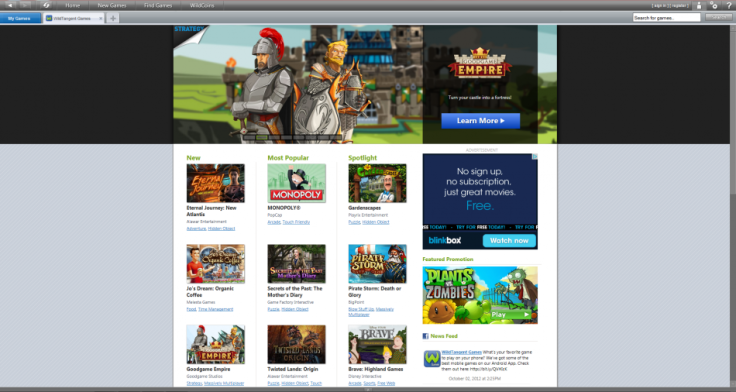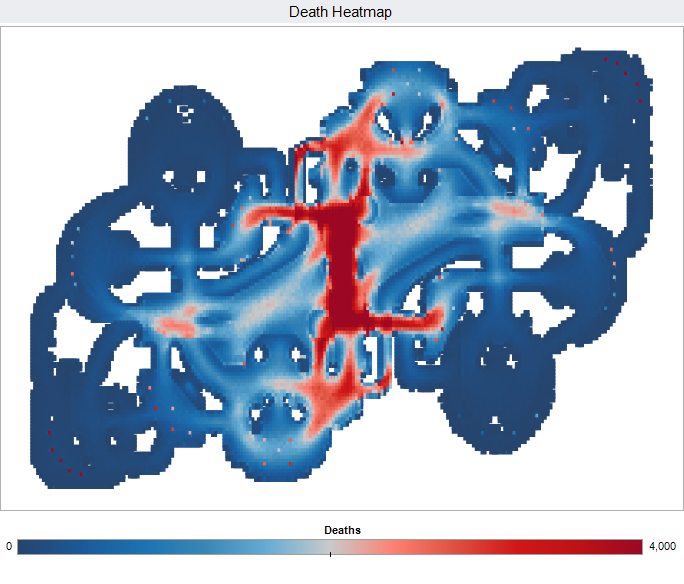Social-Gaming: How Facebook Game Developers are Using Your Data to Build Games for You
Developers increasingly turning to data-mining to directly reach customers
Software developers and advertisers, who build and promote games for Facebook and smartphones, are using data from users to better understand what their customers want.

Tableau, a powerful software tool for analysing and representing vast quantities of data is being used by companies such as social game developer IsCool and media strategist Wild Tangent to better understand the billions of rows of user information that have been collected from their users' search engine trends and social network pages.
That data is being used to decipher which games are proving popular, who is using them and which parts of the game are most successful, and unsuccessful:
"Demographics are a big part of what the games industry is doing" explains Ellie Fields, Tableau's director of product marketing. "In the casual sector, developers find that they're losing people at a certain point or that they're sharing out to people, but more people aren't coming into the game.
"So by analysing the data they can find out that 'oh, these people don't know how to work something here and they're all failing at this point.' So, there's a lot of demographic analysis you can do."
Developed at Stanford University as part of a Department of Defence project to better visualise data, Tableau is the product of Chris Stolte, who was studying his PhD at Stanford at the time, and Pat Hanrahan, a pioneering animation specialist and founding member of Pixar.
After taking a "Product of the Year" award from PC Magazine, Tableau became the go-to software for businesses struggling to analyse their data: Now it's found its way into the game industry:
"Tableau is the tool we've been waiting for" says Scott Moran, business intelligence manager at computer game promoter and developer Wild Tangent.
Starbucks
"I was one of the first employees in Starbucks' IT department. That business was built on looking at your customer's face every day, pouring them a coffee and making them feel like they are the most important person in the world; giving them coffee exactly as they like it.
"My goal is to give that experience to 30 million people - or more - that I can't see over the web. It's about putting a face on this nebulous group of people that I will never see.
"We've implemented what you would call the Amazon recommendation model, or the Netflix recommendation model, so [we can say to] players that have played this game, that there's a high propensity they will like these games as well."

By looking at player's search engine and social networking data, companies like Wild Tangent can target their in-game advertisements at the right consumers. It's part of an on-going 'value exchange' which, according to Moran, allows developers to quickly monetise their games:
"We can now do value exchange for advertising. If a consumer watches an ad, they're given something of value to use within the game they're playing or maybe access to the game for a period of time.
"We work with a lot of Eastern European game developers, and they're popping out like a game a week - the shelf life of these games isn't very long any more. The days of The Sims - a franchise lasting for 30 years - are kind of gone. You're now going to see these fad games come and go.
"It's quick. Quick development, quick work. We have an SDK platform that lets these guys monetise their games as they go, quickly wrapping our stuff around it so they don't have to change the internals.
"And we're splitting that revenue across the developers of that game; the OEM partner; we take a percentage of it - you know, we provide a way to monetise games for developers, very easily."
As the number of games available on Facebook and the App Store surges upwards, it is becoming increasingly difficult for game makers to promote their games, and profit from them. Tableau aims to change that.
By targeting users' likes and dislikes, their buying habits, their age and their gender, Wild Tangent, and French developer IsCool have been able to turn 'fad' games around for quick profit. It's about knowing what works and what doesn't, explains Florian Douetteau of IsCool:
"Typically we'd try to identify when people were engaging with the game, and when they would choose to stop nurturing the game, and then use that information to correct the game. We have to make sure that items in our game aren't too easy to obtain, nor too difficult, so we're required to monitor people who use the game."
So, as well as marketability, is Tableau being used to improve the quality of social games? Ellie Fields seems to think so. She describes how developer High Moon Studios, which recently released Transformers: Fall of Cybertron for the Xbox 360 and PlayStation 3, was able to tailor its online multiplayer maps to suit playing patterns:
"We had High Moon Studios, who were doing death and balance 'heat-maps'. So what they do is take a floor plan of the entire game - in this case a first-person shooter - and they map out, over hundreds of thousands of users, when people were killed and when they killed others and where there was good balance.
"So they can actually look at a gameplay map and say 'well, this area's a problem; everyone is dying over here and they shouldn't be dying over here - this wasn't intended'. Or maybe: 'some people are killing too many others over here.' So that's the kind of analysis that people are doing in Tableau."

Post-launch
But it is not just a case of altering the game post-launch. Tableau has a significant bearing on the social game development process throughout, with developers increasingly looking to user data to decide which game they ought to be making next.
When asked if Wild Tangent commissions games based on information gleaned using Tableau, Scott Moran replied:
"Absolutely. We're primarily an analytics company, who happen to be involved in games, and we use our data to decide which games would be popular and which games to build; we look at which genres are popular, like hidden object games, which are huge.
"We're looking for the next viral game; we want to build it, or be part of it - something like Rovio. If we can find the next Rovio out there, then great"
Privacy
But of course, there are concerns over users' privacy, and the security of their personal data. Facebook has recently been under scrutiny for its partnership with Datalogix, a controversial company which gathers information on shopping loyalty cards, which Facebook is using to target its online adverts.
With so much personal data being gathered in Tableau, and being used to market computer games, Wild Tangent, IsCool and Tableau itself are taking their privacy agreements very seriously:
"We have very tight end user agreement, with all of our users" explains Scott Moran. "We have a privacy officer and he works at executive level on the board. We take privacy here very seriously."
Florian Douetteau says IsCool is similarly cautious:
"Some might be concerned that the information we collect from within the game could be sold to online advertisers, but that's something we are not allowed to do, and something that we don't actually want to do: We don't want to share information on our customers because it could be dangerous for our business. It's wrong."
The level of information that companies can access is also, ostensibly, restricted:
"Our data is not linked back to people. We are able to infer general demographics from it, like gender and, to some degree, how old you are," said Moran.
"We don't access information like people's names" confirmed Douetteau.

However, Ellie Fields says the information gathering potential for Tableau is unlimited, and that, if they wanted to, companies could observe players at an individual level:
"It's basically unlimited; it depends on what data you. If you have data on what every single player is doing, you can go down to that level and there are many games companies actually that do that. The vast majority of data is coming from gameplay analysis, so tracking the actions of user as they're playing these games"
"We can drill down to the individual player and see what they're doing - in fact that's something we do, to identify people who are cheating" continued Douetteau. "We can see when people click on a button in the game and it sends something to Facebook."
Nevertheless, Tableau is here to stay. With an impressive client list that includes game companies like EA, Bioware and Zynga, and consumer giants like Coca-Cola and Starbucks, Tableau Software is being used across dozens of industries to monitor consumer trends, target advertising and increase profits.
"Tableau has a lot of traction" concludes Douetteau. "It allows you to look at your data quickly and in the games industry, we're in an environment where things are changing pretty fast. Things are different from one week to another, and Tableau is great for handling that."
Today, with the industry flooded by independent, mobile, social and console games, data-mining tools like Tableau are becoming increasingly necessary for developers to know their markets; for companies like Wild Tangent and IsCool, Tableau is the best way to keep them ahead of the game.
© Copyright IBTimes 2025. All rights reserved.






















